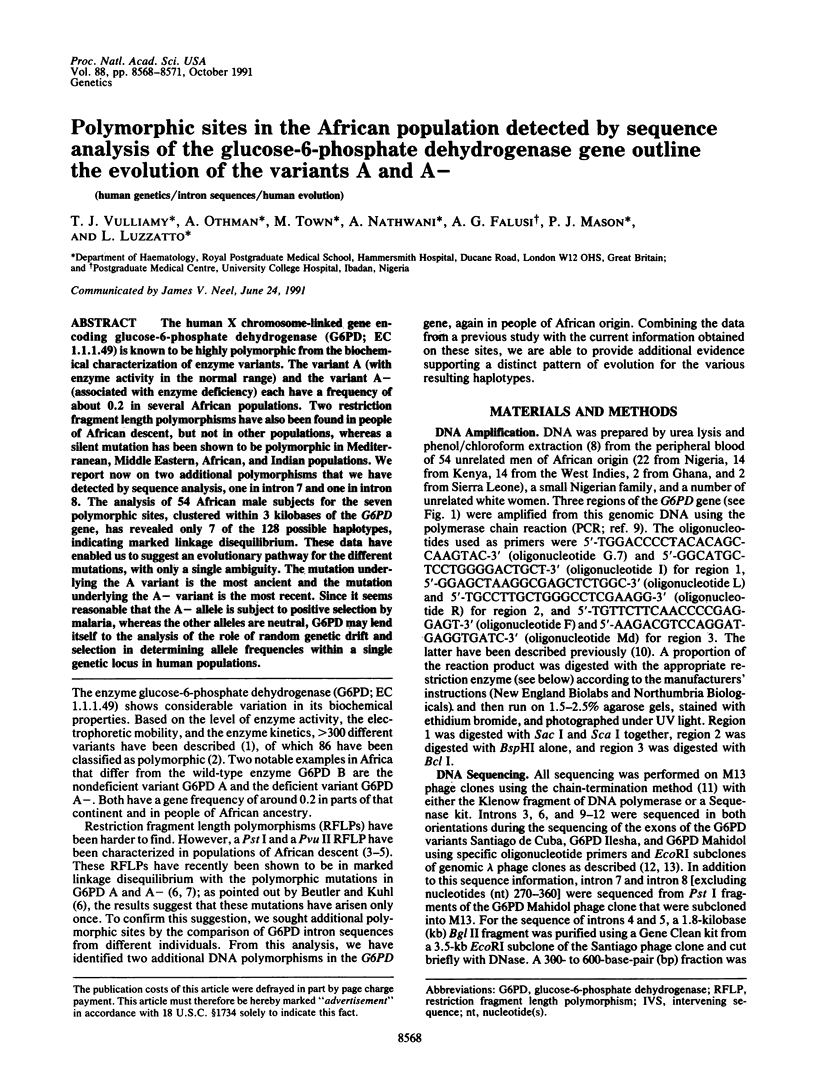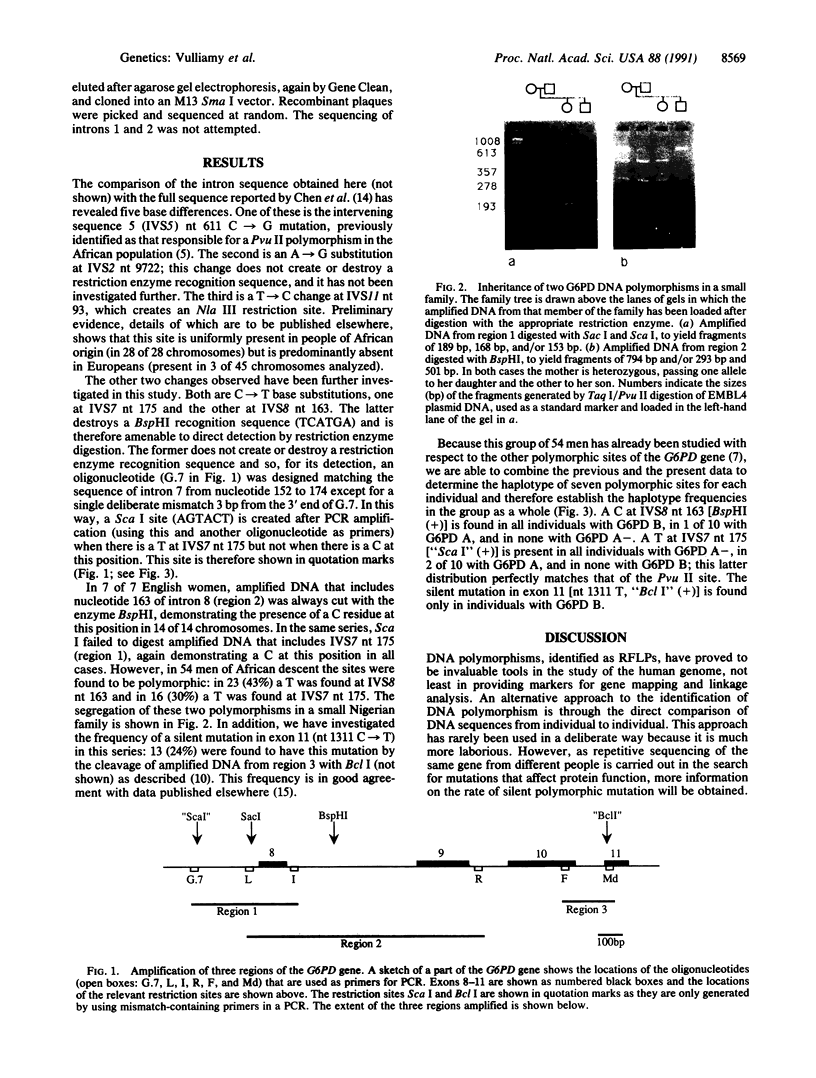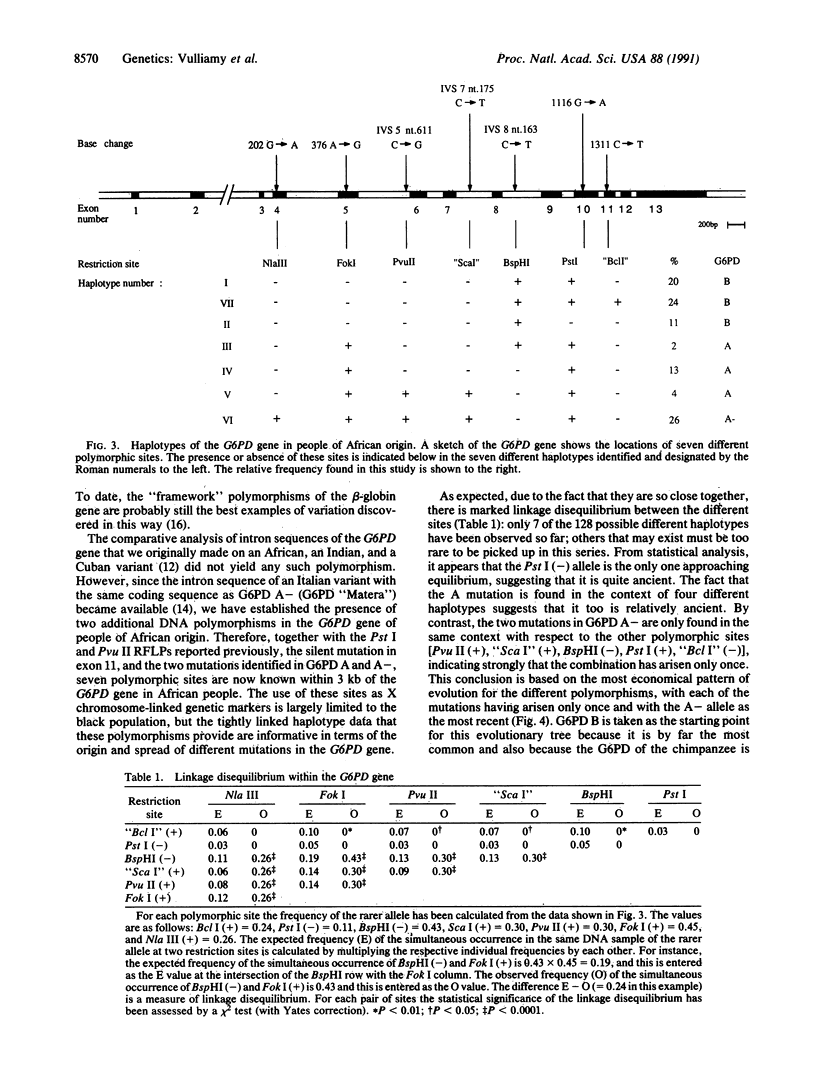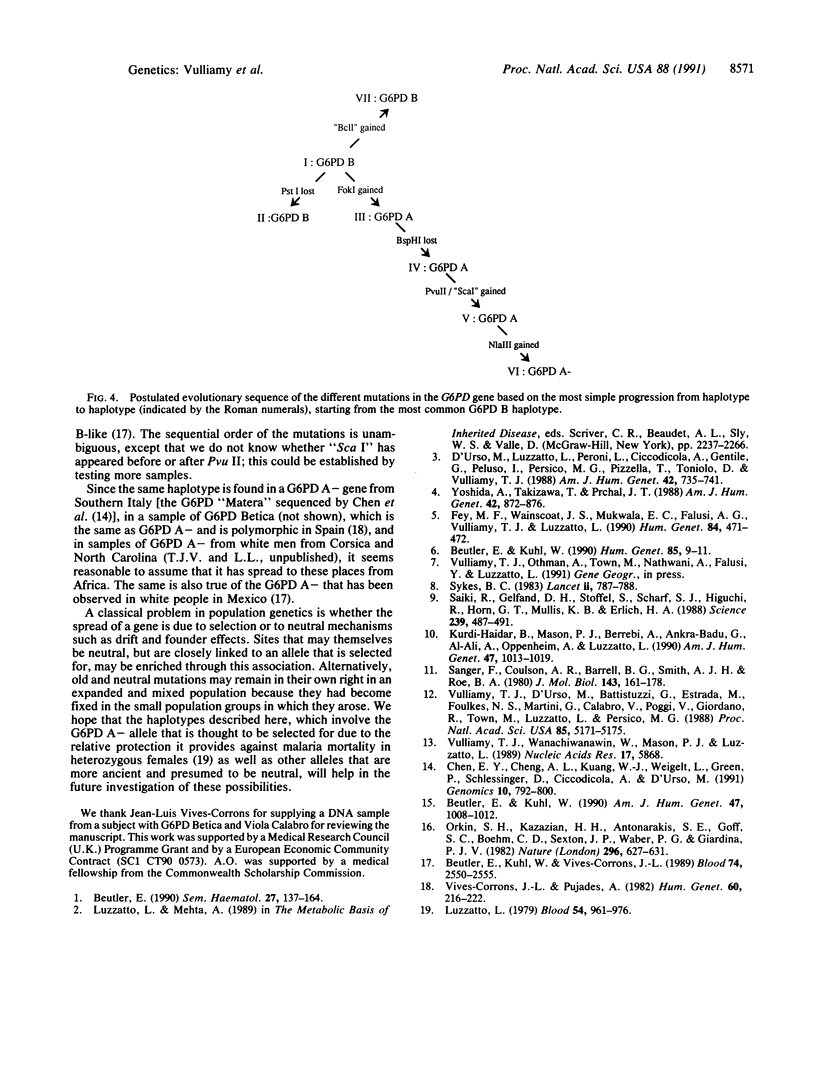Abstract
The human X chromosome-linked gene encoding glucose-6-phosphate dehydrogenase (G6PD; EC 1.1.1.49) is known to be highly polymorphic from the biochemical characterization of enzyme variants. The variant A (with enzyme activity in the normal range) and the variant A- (associated with enzyme deficiency) each have a frequency of about 0.2 in several African populations. Two restriction fragment length polymorphisms have also been found in people of African descent, but not in other populations, whereas a silent mutation has been shown to be polymorphic in Mediterranean, Middle Eastern, African, and Indian populations. We report now on two additional polymorphisms that we have detected by sequence analysis, one in intron 7 and one in intron 8. The analysis of 54 African male subjects for the seven polymorphic sites, clustered within 3 kilobases of the G6PD gene, has revealed only 7 of the 128 possible haplotypes, indicating marked linkage disequilibrium. These data have enabled us to suggest an evolutionary pathway for the different mutations, with only a single ambiguity. The mutation underlying the A variant is the most ancient and the mutation underlying the A- variant is the most recent. Since it seems reasonable that the A- allele is subject to positive selection by malaria, whereas the other alleles are neutral, G6PD may lend itself to the analysis of the role of random genetic drift and selection in determining allele frequencies within a single genetic locus in human populations.
Full text
PDF



Images in this article
Selected References
These references are in PubMed. This may not be the complete list of references from this article.
- Beutler E., Kuhl W. Linkage between a PvuII restriction fragment length polymorphism and G6PD A-202A/376G: evidence for a single origin of the common G6PD A- mutation. Hum Genet. 1990 Jun;85(1):9–11. doi: 10.1007/BF00276317. [DOI] [PubMed] [Google Scholar]
- Beutler E., Kuhl W. The NT 1311 polymorphism of G6PD: G6PD Mediterranean mutation may have originated independently in Europe and Asia. Am J Hum Genet. 1990 Dec;47(6):1008–1012. [PMC free article] [PubMed] [Google Scholar]
- Beutler E., Kuhl W., Vives-Corrons J. L., Prchal J. T. Molecular heterogeneity of glucose-6-phosphate dehydrogenase A-. Blood. 1989 Nov 15;74(7):2550–2555. [PubMed] [Google Scholar]
- Beutler E. The genetics of glucose-6-phosphate dehydrogenase deficiency. Semin Hematol. 1990 Apr;27(2):137–164. [PubMed] [Google Scholar]
- Chen E. Y., Cheng A., Lee A., Kuang W. J., Hillier L., Green P., Schlessinger D., Ciccodicola A., D'Urso M. Sequence of human glucose-6-phosphate dehydrogenase cloned in plasmids and a yeast artificial chromosome. Genomics. 1991 Jul;10(3):792–800. doi: 10.1016/0888-7543(91)90465-q. [DOI] [PubMed] [Google Scholar]
- D'Urso M., Luzzatto L., Perroni L., Ciccodicola A., Gentile G., Peluso I., Persico M. G., Pizzella T., Toniolo D., Vulliamy T. J. An extensive search for RFLP in the human glucose-6-phosphate dehydrogenase locus has revealed a silent mutation in the coding sequence. Am J Hum Genet. 1988 May;42(5):735–741. [PMC free article] [PubMed] [Google Scholar]
- Fey M. F., Wainscoat J. S., Mukwala E. C., Falusi A. G., Vulliamy T. J., Luzzatto L. A PvuII restriction fragment length polymorphism of the glucose-6-phosphate dehydrogenase gene is an African-specific marker. Hum Genet. 1990 Apr;84(5):471–472. doi: 10.1007/BF00195822. [DOI] [PubMed] [Google Scholar]
- Kurdi-Haidar B., Mason P. J., Berrebi A., Ankra-Badu G., al-Ali A., Oppenheim A., Luzzatto L. Origin and spread of the glucose-6-phosphate dehydrogenase variant (G6PD-Mediterranean) in the Middle East. Am J Hum Genet. 1990 Dec;47(6):1013–1019. [PMC free article] [PubMed] [Google Scholar]
- Luzzatto L. Genetics of red cells and susceptibility to malaria. Blood. 1979 Nov;54(5):961–976. [PubMed] [Google Scholar]
- Orkin S. H., Kazazian H. H., Jr, Antonarakis S. E., Goff S. C., Boehm C. D., Sexton J. P., Waber P. G., Giardina P. J. Linkage of beta-thalassaemia mutations and beta-globin gene polymorphisms with DNA polymorphisms in human beta-globin gene cluster. Nature. 1982 Apr 15;296(5858):627–631. doi: 10.1038/296627a0. [DOI] [PubMed] [Google Scholar]
- Saiki R. K., Gelfand D. H., Stoffel S., Scharf S. J., Higuchi R., Horn G. T., Mullis K. B., Erlich H. A. Primer-directed enzymatic amplification of DNA with a thermostable DNA polymerase. Science. 1988 Jan 29;239(4839):487–491. doi: 10.1126/science.2448875. [DOI] [PubMed] [Google Scholar]
- Sanger F., Coulson A. R., Barrell B. G., Smith A. J., Roe B. A. Cloning in single-stranded bacteriophage as an aid to rapid DNA sequencing. J Mol Biol. 1980 Oct 25;143(2):161–178. doi: 10.1016/0022-2836(80)90196-5. [DOI] [PubMed] [Google Scholar]
- Sykes B. C. DNA in heritable disease. Lancet. 1983 Oct 1;2(8353):787–788. doi: 10.1016/s0140-6736(83)92314-0. [DOI] [PubMed] [Google Scholar]
- Vives Corrons J. L., Pujades A. Heterogeneity of "Mediterranean type" glucose-6-phosphate dehydrogenase (G6PD) deficiency in Spain and description of two new variants associated with favism. Hum Genet. 1982;60(3):216–221. doi: 10.1007/BF00303006. [DOI] [PubMed] [Google Scholar]
- Vulliamy T. J., D'Urso M., Battistuzzi G., Estrada M., Foulkes N. S., Martini G., Calabro V., Poggi V., Giordano R., Town M. Diverse point mutations in the human glucose-6-phosphate dehydrogenase gene cause enzyme deficiency and mild or severe hemolytic anemia. Proc Natl Acad Sci U S A. 1988 Jul;85(14):5171–5175. doi: 10.1073/pnas.85.14.5171. [DOI] [PMC free article] [PubMed] [Google Scholar]
- Vulliamy T. J., Wanachiwanawin W., Mason P. J., Luzzatto L. G6PD mahidol, a common deficient variant in South East Asia is caused by a (163)glycine----serine mutation. Nucleic Acids Res. 1989 Jul 25;17(14):5868–5868. doi: 10.1093/nar/17.14.5868. [DOI] [PMC free article] [PubMed] [Google Scholar]
- Yoshida A., Takizawa T., Prchal J. T. RFLP of the X chromosome-linked glucose-6-phosphate dehydrogenase locus in blacks. Am J Hum Genet. 1988 Jun;42(6):872–876. [PMC free article] [PubMed] [Google Scholar]




